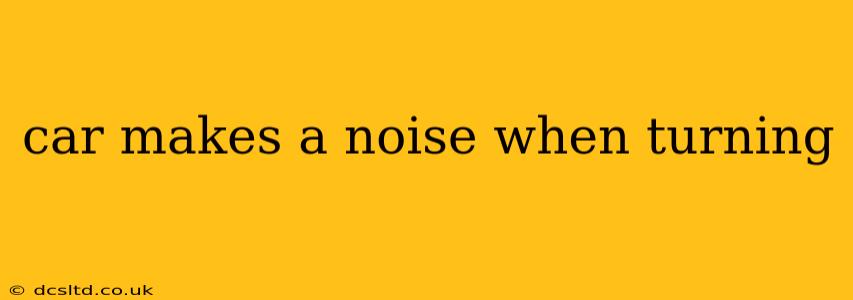Hearing a noise when turning your car can be alarming, but pinpointing the source can help you address the issue quickly and safely. This noise could stem from several components, ranging from minor inconveniences to serious mechanical problems. Let's explore the common culprits and how to troubleshoot them.
What are the common causes of noises when turning?
This is a broad question with many potential answers. The type of noise (grinding, clicking, popping, whining, etc.) and when it occurs (sharp turns, slow turns, only at low speeds, etc.) are crucial in diagnosing the problem. However, some common sources include:
-
Power Steering System: This is a frequent culprit. Problems can range from low power steering fluid to a failing power steering pump or rack and pinion. A whining or groaning noise, particularly during slower turns, often points to low fluid or pump issues. A knocking or clunking sound might indicate problems with the rack and pinion.
-
Wheel Bearings: A grinding or humming noise that increases with speed, especially when turning, often signals worn wheel bearings. This is a serious safety concern and requires immediate attention.
-
Suspension Components: Various suspension parts, such as ball joints, control arm bushings, or tie rod ends, can produce clicking, popping, or knocking sounds when turning, especially over bumps. These noises often change depending on the direction of the turn.
-
CV Joints (Constant Velocity Joints): These joints allow the drive shaft to transmit power to the wheels while turning. A clicking or popping sound, particularly when turning at low speeds, often indicates a failing CV joint. This noise is often more pronounced during sharper turns.
-
Brakes: While less common, brake issues can sometimes manifest as noises when turning. A grinding sound could indicate worn brake pads or rotors.
What does it mean if my car makes a clicking noise when turning?
A clicking noise when turning often points towards issues with the suspension system, CV joints, or sometimes the power steering. The location and frequency of the clicks can help narrow it down. Multiple clicks might suggest a problem with the CV joint, whereas a single, sharp click could indicate a suspension component.
Why does my car make a grinding noise when turning?
A grinding noise is more serious and could indicate several potential problems. Worn wheel bearings are a prime suspect, as are worn brake pads or rotors. A grinding noise in the power steering could signify a severely damaged pump or rack and pinion. Immediate inspection is recommended.
How much does it cost to fix a car that makes noise when turning?
The cost to repair a car making noise when turning varies dramatically based on the underlying cause and the extent of the damage. A simple low power steering fluid top-up might only cost a few dollars, whereas replacing a wheel bearing or CV joint could cost hundreds of dollars. Suspension component repairs can also range significantly in price. A professional mechanic's diagnosis is essential to get an accurate estimate.
What should I do if my car makes a noise when turning?
Don't ignore the noise! It’s crucial to have a qualified mechanic inspect your car as soon as possible. Ignoring the issue could lead to more extensive damage, potentially creating a dangerous driving situation. The sooner you address the problem, the less expensive and less disruptive the repair will likely be. Safety should always be your top priority.
Conclusion
A noise when turning your car necessitates prompt attention. While some causes may be minor, others pose significant safety risks. By carefully observing the type of noise and when it occurs, you can provide valuable information to your mechanic, leading to a faster and more accurate diagnosis and repair. Don't delay; get your car checked by a professional to ensure safe and reliable driving.
